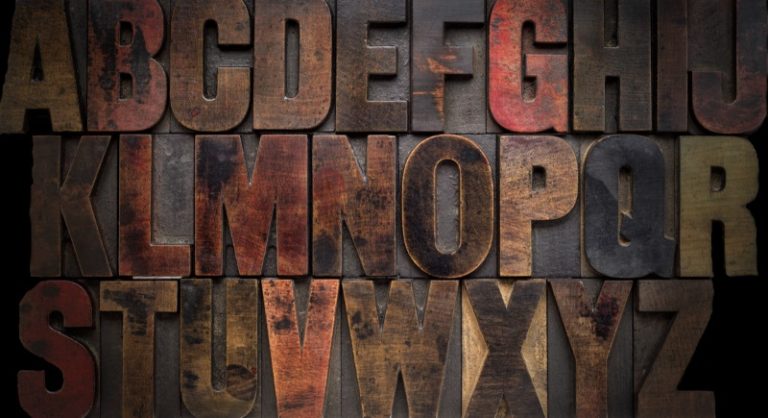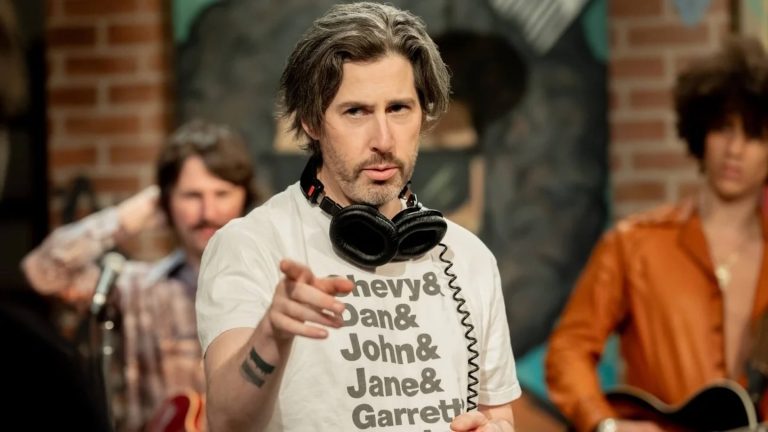The Screenwriter's ABCs: An Alphabet of Screenwriting Advice

If you — the screenwriter — have ever wanted to read screenwriting advice, tips, wisdom, and reflection that are easy to digest and straight to the point, consider your wish granted.
From A to Z and every letter in between, we offer some quick, easy, and helpful words to guide you through your own screenwriting journey.
"A" is for Attitude
Your attitude and how you go about handling every given situation within your screenwriting career — and the pursuit thereof — will define how successful you are. If you are an overly cynical realist, you're not going to last or grow as you blame the system and everyone else but yourself. If you are blindly optimistic, you're going to have your heart crushed over and over until you quit. Stay positive enough to keep you going but be objective enough to keep your head out of the clouds.
"B" is for Bold
You have to be bold in the pursuit of this dream — confident and courageous, but void of any ego. Work on your craft long enough before you take anything out. This will allow you to hone your writing abilities, find your strengths, and work on your weaknesses. Then when you have 3-5 great scripts, you can take them out to the industry and showcase a bold stature. Hollywood doesn't want starry-eyed newbies.
"C" is for Conflict
While the phrase "concept is everything" certainly applies to Hollywood, the true key to a successful screenplay is conflict. Great concepts get you into the door. Great conflict delivers that concept well enough to create engaging page-turners. Pummel your characters with new and ever-evolving conflicts every few pages. There's nothing more boring than reading a script that is void of constant conflict that the characters must face.
Read ScreenCraft's Must-Read Analogy That Teaches “Raising the Stakes” in Screenplays!
"D" is for Diversity
Hollywood is going through a much-needed revolution. They are seeking stories that showcase diversity through gender, race, and social class. All screenwriters need to jump on board this movement and embrace diverse casts of characters, diverse subject matter, and diverse themes.
"E" is for Evoking Emotion
Another key to a successful screenplay is evoking an emotional response with the reader and the audience. The great films make us laugh when we need to laugh, cry when we need to cry, cheer when we need to cheer, scream when we need to scream and vent when we need to vent. A screenwriter's job is to pose themes within their stories that touch on the emotions that accompany those themes. Every scene needs to be a moment. Every scene needs to evoke an emotion that carries the characters forward into the story. Every scene needs to have this underlying agenda of evoking an emotional response from the audience.
"F" is for Finish
Finish that damn script! It shouldn't take a year to write a screenplay. If you're taking a year or more to do so, you're not learning, you're not evolving, and you're certainly not disciplining yourself. How can you possibly expect to take on a screenwriting career if it takes you a year or more to finish a screenplay? Give yourself three months. Discipline yourself and your time management. Finish that script and move onto the next.
"G" is for Grammar
Grammar in a script is about the syntax, sentence structure, and the linguistics that you use to tell your story to the script reader. The grammar that you choose to use to describe scenes and write dialogue for your characters will define the impact of the script reader's read. Don't be too wooden, but also don't be too fancy. Craft a personal style, but not at the expense of what should be a simple read. Don't be lazy with your grammar, but remember that fragments within a screenplay are also very welcome to get that visual across as quickly as possible.
"H" is for High Concept
High Concept is a term that is often misrepresented and misunderstood. It's actually very simple. High concepts emphasize a fascinating and easily communicable premise that has an intriguing hook that is the center of the script. Since concept drives Hollywood — and since concept is what gets you in the door — you want to have screenplays that embrace an intriguing concept with an equally intriguing hook that will immediately communicate what film the powers that be may be buying and selling. A serial killer takes down his victims based on their violations of the seven deadly sins (suspense thriller). In the near future, a lonely writer develops an unlikely relationship with an operating system designed to meet his every need (romance drama). A weatherman finds himself inexplicably living the same day over and over again (comedy). An insurance salesman/adjuster discovers his entire life is actually a television show (dramedy). A man juggles searching for his wife's murderer and keeping his short-term memory loss from being an obstacle (mystery). A guy who complains about God too often is given almighty powers to teach him how difficult it is to run the world (comedy). Have at least a couple great high concept scripts — in whatever genre — within your stacked deck.
"I" is for Inspiration
When you have an idea for a screenplay floating around in your mind, that's the seed. For a seed to grow, you need to water and feed it. Inspiration is your idea's water and food. It's necessary to go elsewhere to help conjure the characters, images, visuals, tones, and atmosphere that you want to use to build that concept up. So the first thing you should do before you write anything is go out and watch movies and television series that share certain elements of what your idea is about, what kind of characters you're developing, or what world your idea may be set in. You'll be surprised how much inspiration you'll get without outright ripping off other stories. Take a little of this, a bit of that, and apply it within the context of your idea. Inspiration is key.
"J" is for Jazz
Screenwriters need to write as Jazz bands play. While great music can undoubtedly be composed and rehearsed with specific notes and composition, the purest and freest type of music is Jazz. It's loose. There's a sense of freedom to it, void of over-analyzed preparation. Screenwriters need to play a little Jazz in their writing. They need to break free of the guru structures and scene breakdowns and just let the concepts, conflicts, and the actions and reactions of their characters come to life.
"K" is for Knowledge
Knowledge is power. You need to know the industry and who the power players are. So read the trades (Deadline, Hollywood Reporter, and Variety), keep up with what scripts are being purchased, developed, and produced (Tracking Board), and know who is representing the writers involved (the trades and IMDBPro).
"L" is for Learning
Learning the general guidelines and expectations of the film and television industry is a must. You accomplish this by starting with the basics, which can be found in books like The Screenwriter's Bible. Then you slowly begin to learn more by seeking out knowledge and wisdom from working screenwriters through interviews, articles, and blogs. And then once you have a handle on the basics, you learn by reading produced scripts and then by writing your own. And the best source of acquired knowledge is often presented by failing early, failing often, and failing forward as you learn from those mistakes.
Read ScreenCraft's 9 Easy Ways Screenwriters Can Learn From Failure!
"M" is for Motivation
Without motivation, you'll be drifting without direction like a feather in the wind, hoping to land somewhere favorable. That will often get you nowhere. So you have to find your motivation. What's going to get you to the finish line? And even more important, what's going to get you in front of that computer day in and day out, enough for you to reach that finish line? What drives motivation in the short term is goal setting. Set your deadlines when you begin a project. Don't leave it wide open, little feather. Set a specific date for you to finally type THE END and save that draft as the Final Draft.
"N" is for New
Give the industry something new. The common phrase that every cynic spouts is, "Everything has been done." It's a lazy outlook. No single tree or snowflake is alike. They've been done a billion times over, sure, but each and every one of them is different. Give the industry a new take on something that has been done before — as opposed to just writing your version of your favorite types of films (heist movie, raunchy party comedy, action blockbuster, horror flick) — or go and give us something that we haven't seen by being proactive enough to use your imagination until you find that special something.
"O" is for Only You
Within your stack of scripts, to truly stand out you need to write something that only you can write. Look at your own life and see if there are any stories you have to tell. Then look at the lives of your relatives or friends — with us or not — and see if there are any engaging ideas. Look at your career, vocation, or the environments you've been in and see if you have a story that only you can tell because of those experiences. Finding stories that only you can tell is the true secret of standing out. It's a selling point that can further peak the interest of the powers that be and tip the scales in your favor. Not every script you write has to be like that, but you need at least one to stand out more.
"P" is for Perseverance
Perseverance is defined as steadfastness in doing something despite difficulty or delay in achieving success. It's not just about accepting rejection — it's about embracing and welcoming it, knowing that it is to be expected and is necessary to learn from. You need to handle failure and rejection with poise and boldness as you stand tall and continue on despite that failure and rejection.
"Q" is for Quickly
As a Hollywood screenwriter, you have to learn to write quickly. Let's face some hard truth, shall we? While writing is an art form and artists tend to embrace the notion that their art can often take some time to "blossom," screenwriting is also a business. If you want to be a screenwriter, you need to learn to write quickly. This whole "it took me a year to write this script" is a joke within the context of you wanting to become a professional screenwriter. The standard contract for a screenwriting assignment will generally stipulate that the writer will have ten weeks to finish the first draft of a script. That's less than three months. So the best that you can do for your career is create a process that gets you to a final draft within that time limit. To give yourself some room, take an extra couple of weeks to make it a full three months if you need to. When you get into the habit of writing quickly, once you get that big break the transition will be all the easier for you.
"R" is for Reward Yourself
When you finish a script, reward yourself. Celebrate. Go out with your friends and family. Take a little trip or just reward yourself with some free time. It's an accomplishment to be proud of. Beyond that, you need some time away from the script before you go back in and read it from beginning to end. Then the real work begins as you see your missteps and make that script better. But rewarding yourself with time off and time away is key to keeping sane and motivated.
"S" is for Success
This is an important letter and word. Success is what we strive for. It's what all screenwriters hope for and dream of. But you have to understand that success in screenwriting is not a singular possession, event, or goal. It's an ongoing journey with multiple levels that never ends. Aaron Sorkin is still seeking various degrees of success. Getting someone in the industry to read your script is a success — but it doesn't stop there. Winning a contest or fellowship is a success — but it doesn't stop there. Getting representation is a success — but it doesn't stop there. Getting meetings at studios interested in your work is a success — but it doesn't stop there. Optioning a script, selling a script, or being assigned to write a script is a success — but it doesn't stop there. Seeing one of your scripts produced is a success — but it doesn't stop there. So just understand that there are varying levels of success and none of them will ever be this mythical possession, event, or goal achieved.
"T" is for Tight
Any draft that you hand over to contests, fellowships, managers, agents, producers, or development executives has to be the tightest draft possible. Every scene, every line of description, and every line of dialogue has to be in that script for a reason. Do everything you can to tighten that draft down to its core. Be vigilant about it, to the point where it's almost an obsession. Kill your darlings and trim away all of the fat because a tight draft is a great read — and a great read is what gets that script passed up the totem pole.
"U" is for Unique
One of the biggest misconceptions that screenwriters have is that Hollywood wants screenplays that are more of the same, as far as what is succeeding at the box office. That is why screenwriters end up wasting their time by chasing trends and writing their own versions of recent hits. What most don't know is that, sure, on the outside Hollywood is clearly giving audiences what they think they want, based primarily on box office numbers. But behind-the-scenes, Hollywood development executives are looking for unique scripts. Something new (which we covered above) and something different. Trend chasing is usually handled by studio screenwriters already developing scripts based off of buzz about upcoming and recent hits. They're already in the game and the system, so there's a faster turnaround. By the time newcomers come into the picture, the trends are exhausted (it takes at least a year or two to get a film produced and released once greenlit). So newcomers stand out by having unique scripts — potential future trends. Look no further than Black List scripts like Bubbles for examples of standing out with unique screenplays.
"V" is for Voice
You need to find your own voice within your writing, as opposed to emulating others. You'll never be the next Sorkin, Tarantino, Cody, or Black. Be the first YOU. While this does go hand-and-hand with NEW and UNIQUE, it specifically points to your style of writing, the prose you use, and the different touches you make within the script you've written. There was no Diablo Cody before she came along. There was no Tarantino before he came along. There was no Sorkin before he came along. Do you, not them or anyone else. That's what will make you stand out.
"W" is for Water Bottle Tour
If you've managed to get that manager or agent, congratulations. Now the work really begins. If you're in Los Angeles — or have traveled there at the behest of your representation — your reps will be doing what they can to get as many possible meetings set up for you, usually based off of a single script you've written. This is the Water Bottle Tour, referencing the likely occurrence at the beginning of each meeting when the assistants will offer you a bottle of water before the meeting starts. First and foremost, don't be polite and say, "No thanks." Take it because nerves can mess with your voice. Secondly, breathe. They're human just like you and just want to have a conversation. Finally, know your logline, themes, characters, and stories enough that you can answer any and all questions. Be yourself.
"X" is for X Factor
Hollywood is always looking for the X Factor in a screenwriter. The problem is, most of the time they don't even know what that X Factor is. All that you can do is find your unique voice and bring something new to the table. Take chances. Take risks. Go against the grain. Don't try to give them what they and you think they want. Give them something they didn't even know they needed.
"Y" is for Yes
Yes is a word you won't often hear in the film and television industry. You'll hear no more than you will ever hear a yes when you're asking contests or fellowships to announce you as their winner, when you cold query industry insiders asking to read your scripts, when you're waiting to see if your manager or agent has sold your script or attached you to an assignment, etc. A yes is something you earn, not something you're entitled to. And be comforted knowing that you're in good company because this applies to each and every screenwriter, no matter what level of success they have or have not enjoyed — all of the way up to the top 1%. It's the nature of the business.
"Z" is for The Zone
When we're talking about the writing process, it's all about getting into the zone. The zone is that time and frame of mind where you are locked into your story, your characters, and are truly seeing your movie or series playing within your mind's eye — audio, visuals, and all. Most writers only get into that zone for short bursts of writing time. Despite what any writer claims, no one is in that zone for eight hours a day. It's often an hour or two at most — if that. But when you're in the zone, that's where cinematic magic is created.
To get into the zone, you have to do the prep. Before you write one single word, you have to see what you're going to write first. You have to visualize it. You have to let it play over and over until you're ready to translate that through your mind, into your fingers, and onto those keys. So do whatever your writing process calls for in order to be ready to write. Go on walks, runs, or long drives. Daydream. Watch movies for that inspiration to water and feed the seed that is your idea. Listen to music to drive that cinematic experience.
Read ScreenCraft's How to Use Music to Write Better Screenplays!
And then get in that zone and let the magic happen.
Ken Miyamoto has worked in the film industry for nearly two decades, most notably as a studio liaison for Sony Studios and then as a script reader and story analyst for Sony Pictures.
He has many studio meetings under his belt as a produced screenwriter, meeting with the likes of Sony, Dreamworks, Universal, Disney, Warner Brothers, as well as many production and management companies. He has had a previous development deal with Lionsgate, as well as multiple writing assignments, including the produced miniseries Blackout, starring Anne Heche, Sean Patrick Flanery, Billy Zane, James Brolin, Haylie Duff, Brian Bloom, Eric La Salle, and Bruce Boxleitner. Follow Ken on Twitter @KenMovies
For all the latest ScreenCraft news and updates, follow us on Twitter, Facebook, and Instagram.
Tags
Get Our Screenwriting Newsletter!
Get weekly writing inspiration delivered to your inbox - including industry news, popular articles, and more!



























